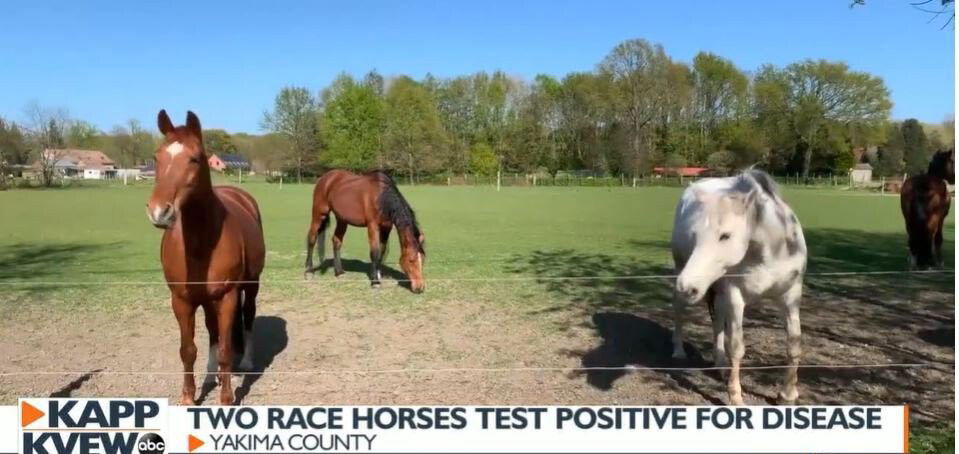WSDA asks racehorse owners to test for equine infectious anemia

The Washington State Department of Agriculture is urging racehorse owners to check their horses for equine infectious anemia after two racehorses tested positive for the disease in Yakima County.
By Emily Goodell
Click here for updates on this story
YAKIMA COUNTY, Washington (KAPP) — The Washington State Department of Agriculture is urging racehorse owners to check their horses for equine infectious anemia after two racehorses tested positive for the disease in Yakima County.
There’s no cure, treatment or vaccine for equine infectious anemia. Infected horses can show no symptoms or display symptoms like lethargy, low-grade fevers or acute pain.
“It can be fatal,” WSDA Region 3 Field Veterinarian Bruce Hutton said. “Oftentimes, it’s not fatal, which is kind of a problem because they never clear the virus. When it’s not fatal, they become carriers for life.”
Hutton said this is the first time a case of equine infectious anemia has been reported in Washington state since 2015. He said the disease can be spread by bloodfeeding insects like horse flies, traveling between an infected horse and a healthy one.
“The other cause of the spread is through contaminated needles, reusing equipment or needles between infected and non-infected horses, which is probably how these two horses got infected,” Hutton said.
Hutton said the two horses had been participating in bush track racing — which is unsanctioned and unregulated — over the summer in both Washington State and California. He said 80% of equine infectious anemia cases in the U.S. are reported among racehorses.
According to Hutton, horses that largely stick to one property and aren’t taken across the county, state or country are less at risk for exposure to equine infectious anemia and those that travel frequently, especially to unsanctioned races, are at higher risk.
Hutton said that’s because sanctioned races require a racehorse to take an antibody test prior to the event to ensure they have a clean bill of health. He said the antibodies typically appear within 30 to 60 days, but it some cases, may not appear within five or six months.
“If it does become positive, the state of Washington has two options for you: lifetime quarantine with no exposure for 200 yards to another horse, or euthanasia,” Hutton said.
Hutton said the two horses that tested positive for the disease are currently quarantined on their respective properties. He said six other horses with confirmed exposure have tested negative.
“WSDA thinks we have it pretty much contained to the two premises and we will monitor the exposed horses,” Hutton said. “We will test them again in 30 days and 60 days to make sure … they weren’t infected and we just haven’t picked it up yet.”
Hutton said while the risk that a racehorse was exposed to one of these two horses in a way that caused them to become infected with equine infectious anemia is low, the consequences are high enough that testing is a necessary precaution.
“That yearly test, even if you’re not traveling outside of the state of Washington, if you think your horse is living a lifestyle that puts him in a higher risk, that seems like pretty cheap insurance,” Hutton said.
Please note: This content carries a strict local market embargo. If you share the same market as the contributor of this article, you may not use it on any platform.